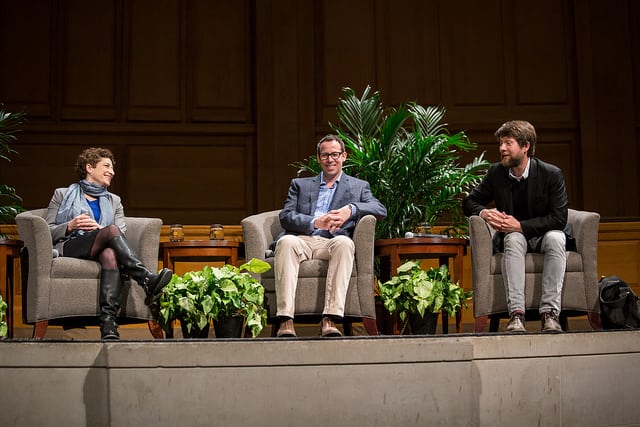Truth, Lies, and Politics Panel Sparks Debate Among Experts
“If you elect people who don’t believe in government […] and the system fails – it’s the classic self-fulfilling prophecy.” Dr. Naomi Oreskes, Professor of the History of Science and Affiliated Professor of Earth and Planetary Sciences at Harvard University, was among three experts who came to Wake Forest on February 16 for Truth, Lies, and Politics: Ideology, Rationality, and Choice in an Election Year, a panel discussion hosted in Wait Chapel.

The discussion, moderated by Dr. Melissa Harris-Perry, Presidential Endowed Professor of Politics and International Affairs at Wake Forest, exposed the ways that mistrust in the idea of government, is not only toxic, but also erroneous in its inception. “Sewing that mistrust is part of a political program that actually produces the government that it tells you is already there,” explained Jed Purdy, Professor of Law at Duke University.
Each panelist brought a unique perspective on the obligations citizens have to be informed about issues like climate change and economic inequality, the impact of media on our democracy, as well as the relationship between ideology and belief.
Harris-Perry challenged panelists with a series of thought-provoking questions aimed at considering whether we are inclined to understand others’ choices when our perceptions are obscured by the rhetoric we hear. Dr. Keith Payne, Professor of Psychology and Neuroscience at the University of North Carolina at Chapel Hill, whose lab studies how inequality shapes the human mind, argued “I think we have to meet people where they are in terms of what’s moving them emotionally. This is done with individual story-telling as opposed to the kind of science we base those stories on.”
Panelists debated the way individuals respond to apparent facts and figures set forth by the media. Oreskes made clear the distinction that “climate change is not a scientific disagreement,” stating that we simply “have a political disagreement about what to do about it.” Oreskes, whose research focuses on the earth and environmental sciences, suggested the real question becomes, “How do we understand people’s choices in a world where those choices are structured by rhetoric, by advertising, by think tanks who we know promote disinformation?”
Alyshah Aziz, a Politics & International Affairs major from the class of 2016, described the panel as a “refreshing change of pace,” noting that of all the panels at Wake Forest she has attended, she has never seen “such honest conversation and disagreement between panelists that included cutting into one another’s sentences, especially not in Wait Chapel.” Ideological polarization is difficult to talk about when everyone agrees, and “this panel was one for the books,” Aziz said.
Dr. Adrian Bardon, Associate Professor of Philosophy at Wake Forest, reflected on the panel as a whole, stating, “It is hard to see how we can make progress on issues of urgent public interest if ideological polarization prevents different groups from agreeing on a basic picture of the problems at hand. This is why the issue of polarization and the science communication environment may be the most important issue we face.”
The panel was co-sponsored by Wake Forest’s Office of Sustainability, the Center for Energy, Environment & Sustainability, Department of Philosophy and the Thomas Jack Lynch Philosophy Fund, Department of Psychology, School of Law, Department of Politics and International Affairs, Department of Communications, Wake the Vote, College Democrats, The Arch Society, The Euzelian Society and Student Environmental Action Coalition.
Click here to view photos from the event.
Click here to read an article about the panel published in Old, Gold and Black.
